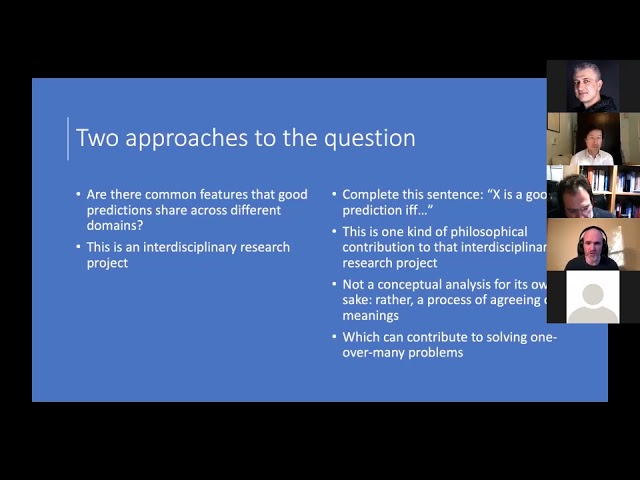












Click on the title of the presentation to view it.
[Note: not all presentations are available]
The workshop took place online on Zoom
March 18
12:00 – 2:00pm Welcome / Prediction in Classical and Quantum Physics
(Chair: Aristotle Tympas)
Theodore Arabatzis,
National and Kapodistrian University of Athens
“The Perils of Prediction Project”
Léna Soler,
Université de Lorraine, Archives Henri Poincaré
“What Would It Be like to Be Bohmians? Predictions as Paradigm Dependent: The (Big) Difference That It Makes”
3:30 – 5:30pm Computation, Simulation, and Prediction (Chair: Ana Simões)
6.00 – 8.00pm The Changing Fortunes of Prediction (Chair: Friedrich Steinle)
Radin Dardashti,
University of Wuppertal
“Predictions in Fundamental Physics and the Future of Theory Assessment?”
Miles MacLeod,
University of Twente
“Doing without Prediction: The Case of Sustainability Science”
March 19
12:30 – 2:00pm Prediction in the Environmental Sciences (Chair: Theodore Arabatzis)
Gabriele Gramelsberger,
RWTH Aachen University
“Cloud Parametrization Deadlock in Climate Models”
Matthias Heymann,
Aarhus University
“Climate Modeling and the Perils of Prediction”
3:30 – 5:30pm Prediction in the Earth Sciences (Chair: Kostas Gavroglu)
6.00 – 8.00pm The Epistemology of Prediction (Chair: Hasok Chang)
Wendy Parker,
Virginia Tech
“Predicting Future Weather and Climate: From Models to Expert Judgment”
Alex Broadbent,
University of Johannesburg
“What Is a Good Prediction?”

